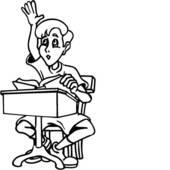
2. Students learn better when teachers look at learning from the students' point of view. Students need methods of instruction that suit their learning styles and "learning profiles".
In his 2001 book, Historical Thinking and Other Unnatural Acts, Sam Wineburg argues that our "package" of previous knowledge, perspectives, interests and skills means that our brains respond to new information in different ways than our students do. We have become trained to look at the world and the past in very different ways from average people. What we find fascinating they may find pointless. New information that quickly connects to our existing memories finds no connections in theirs. We need to understand where our students are "coming from" as learners in order to present our material in a way their brains will respond to.
We cannot assume that students see learning History in the same way that we do:
- We usually love to read
- We find History intrinsically interesting
- We are disciplined learners
- We are in control of our learning
- We have been trained to think in Historical ways
- We feel successful when we study History
- We have a huge accumulated body of knowledge and life experience that gives us
perspective on events, reference points, the ability to make sense of new information
To be successful with today's students we have to understand and accept that many students see education far differently than we do:
- Their learning styles and dominant "intelligence" may not be the same as ours,
and their
strongest style may not be conducive to studying History
- Their intelligence, strength of memory may be different than ours
- They may have learning difficulties and handicaps that require accommodation
- Their ability to focus, powers of concentration, learning skills aren't the same as ours
- Our awareness of cultural and social differences and needs will be different than theirs
- What they find interesting is different than what interests us
- What they are most successful at - as students and in life - is different than our areas
of
high success
- They may see no rewards, only frustration and failure in trying to study History
We need to learn more about our students at the start of the course through conversations, interest surveys and student biographies. What are their interests? How do they understand things? How do they like to learn?
Next: Making Connections Between New Information and Existing Memories